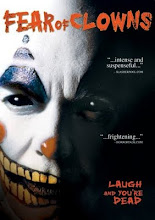Uh oh, this scene's gonna be boring without some unmotivated movement...
You know, I try to stay away from giving advice regarding filmmaking because let's face it: Who the hell am I to be giving advice? (and if you've ever seen my early movies, you're probably nodding your head right now)
Practical advice, like, what kind of microphone should you use/not use or what's a good way to use guns in the street with no permits so nobody gets shot or arrested? Yeah, I'll do that. But advice regarding actual directing? I try to stay away.
But I feel like I want to put this out there so maybe younger filmmakers will start to consider this aspect of what I'm seeing more and more of. The topic is: Unmotivated movement.
It's always been a pet peeve of mine. I'm not even sure most new filmmakers even understand what it is. So, here ya go.
When you set up a shot that has movement in it you need to consider WHY you are moving the camera. If you are moving the camera because your shot is boring otherwise then that is unmotivated movement. You'll find a lot of this during conversations between people.
And sure, I've even been guilty of this on occasion. You got two talking heads on the screen for two minutes and it feels like DEATH. I know. Best advice I ever heard about this is to GET YOUR TALKING HEADS WALKING. Instead of sitting down, have them GOING somewhere. Now you have motivated movement because if your camera doesn't move then it's missing the action.
THAT is the prime reason for camera movement. The camera should be moving to follow the action or to draw the viewer's eye to something.
The only other reason to move the camera is to reveal the geography of a scene that may come in to play later. So you're orienting the viewer so they understand the scene that will unfold.
That's pretty much it. (other than using certain movements to dramatically emphasize/de-emphasize a character) Sure, I'm simplifying it quite a bit. There's stylistic reasons and there's mood-related reasons. But that's not why many of today's budding filmmakers are moving the camera--they're moving the camera because STATIC(NON-MOVEMENT) IS BAD(in their head).
I know, you got that new slider for your DSLR so you really wanna move the camera parallel to what's going on because FILM IS MOVEMENT, man!(I don't remember where I first heard this quote) But it's really not.
And why not, you ask? Well, one reason is because if every shot is moving then every shot with movement loses its meaning, its punch. If you have three static shots of individual people, then a shot where you're pushing in on another person, that last shot will bring extra meaning to that person(the viewer will understand that person or moment is important). Now if you have the same push in on four different people, it's meaningless.
So all I'm asking is to think about WHY you're moving the camera in your shot. If there's no reason and you want the movement anyway, add a reason. It'll improve the shot.
Trust me, I know what I'm doing. You know how you know? Look, I have one of those douchey pictures where I'm framing a shot, that's how you know. :)




